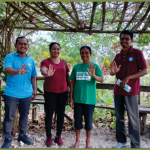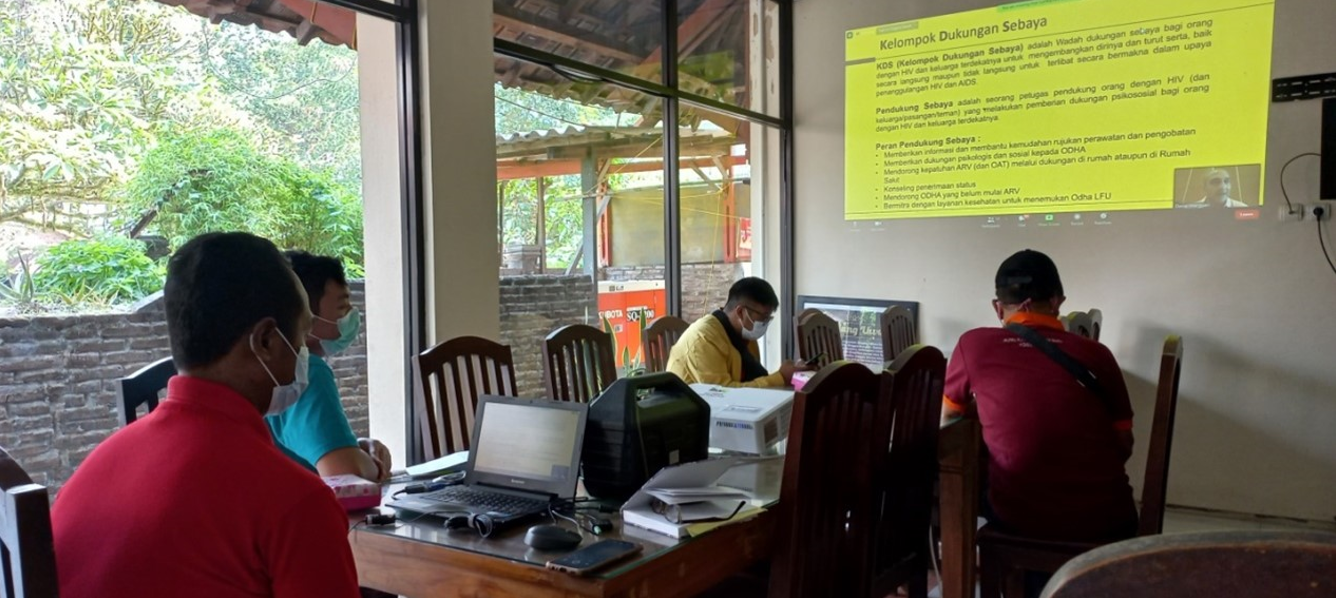
Strengthening Identity to Make Dreams Come True
May 3, 2024
A Good Cadre of Herbal Drink Making for the Elderly
June 5, 2024Reducing Stigma and Discrimination through Ecclesiastical Spirit

CD Bethesda YAKKUM partners workshop participants are paying attention to the speaker’s presentation
In 2019, the Asia Pacific region had 5.8 million people living with HIV (PLHIV) (UNAIDS Report, 2020). China, India, and Indonesia accounted for nearly three-quarters of the total PLHIV in the region. Three-quarters of these infections occur among key populations and their partners. Risky behaviors such as multiple sex partners and low condom use among men who have sex with men (MSM) and Trans need to be addressed. In the absence of supportive national policies, many PLHIV continue to experience stigma and discrimination that prevent them from seeking treatment and prevention. Effective advocacy attempts are needed to improve laws and social, sexual, and gender norms that will increase the vulnerability of key populations to HIV across the region.
To respond to this situation, the Christian Conference of Asia (CCA), through Action Together in Combating HIV and AIDS in Asia (ATCHAA), uses programs focusing on churches, church councils, institutions, and HIV and AIDS communities throughout Asia. Some programs include skills development and advocacy for HIV and AIDS-competent church communities.
On 15-17 June 2021, CCA held an online Regional Capacity Building Training on HIV and AIDS Advocacy during the COVID-19 Pandemic. The training objectives are to equip facilitators for HIV response in Asia, to develop a regional strategy for church inclusiveness about HIV and AIDS issues, to strengthen church HIV and AIDS advocacy, to strengthen advocacy on prevention, treatment, care, and support, and to advocate for accessibility of services during the pandemic. Participants came from various countries. Sukendri Siswanto, Sadinah, Ghanis Kristia, Yoshepin Dian Sarimastuti and Panduarti Prissabat represented CD Bethesda YAKKUM.
Each country drafted an action plan at the end of the session. CD Bethesda YAKKUM joined the Indonesian group and formulated an invitation campaign not to stigmatize and discriminate. It will involve the religious leaders as role models. As an action, there will be a national workshop to strengthen national advocacy related to HIV and AIDS and invite the public to support PLHIV during the COVID-19 pandemic.
Following the CCA training, CD Bethesda YAKKUM made campaign media as posters, banners, and mini banners. It contained an invitation not to stigmatize and discriminate against PLHIV using religious leaders (pastors and preachers) as role models. The second action plan was to realize the agenda of the online national workshop, carried out with a coordination series for the concepts, proposals, terms of reference, and other technical participation matters. It collaborated with the CCA, the Fellowship of Churches in Indonesia, and the CCA network. The workshop was held on 1-3 September 2021 with funding from CCA.
The workshop's purpose is to build a common perspective on the issue of HIV. First, it will provide a new understanding for facilitators (activists and religious institutions) so that they can respond to the HIV issues from a more humanist perspective, strengthening the foundation and basis of HIV advocacy for the ministry of religious institutions, especially churches in Indonesia. Second, strengthening advocacy in prevention, treatment, and support for people infected with HIV and AIDS, building inclusive care strategies, including in social and religious services, and building care for others, especially marginalized communities, in the pandemic.
Thirty participants from various churches, NGOs, and communities concerned about HIV attended the training. The speakers were representatives from religion-based organizations, PLHIV organizations, and civil society organizations working on HIV and AIDS advocacy.
Indonesian Communion of Churches’ Secretary General Rev. Jacklevyn F. Manuputty welcomed the participants and thanked CCA for initiating the program. He said strengthening advocacy efforts in the prevention, treatment, and support of PLHIV should be a priority for churches in Indonesia, adding that churches should build inclusive care services that include social and spiritual aspects.
Daniel Marguari delivered the first session from Spiritia Foundation. Daniel provided insights into the HIV and AIDS situation in Indonesia and factors that hinder the progress of HIV advocacy, such as lack of access to treatment, lack of government support, and community stigma and discrimination.
The next session was facilitated by Berlina Sibagariang from Batak Christian Protestant Church AIDS Ministry and Panduarti Prissabat from CD Bethesda, with material on HIV and AIDS myths and facts. In this material, the myths circulating in the community contribute to stigma and discrimination. Thus, advocacy and education efforts for the general public are needed to change the paradigm and reduce stigma and discrimination against PLHIV. In group discussions, participants discussed the myths and facts of HIV and AIDS in the local context and then presented them.

National Capacity Building on HIV and AIDS Advocacy in Indonesia via Zoom on 1-3 September 2024
The workshop included testimonies from two individuals living with HIV from Positive Indonesia Networking. They shared their challenges as people living with HIV during the COVID-19 pandemic, emphasizing the difficulties in accessing services due to restrictions and other constraints. They pointed out the heightened vulnerability of people living with HIV to COVID-19. They emphasized the importance of access to prevention, vaccines, treatment, and support for issues related to violence and mental health. The participants concluded that there is a need for an advocacy movement to ensure non-discriminatory services, support, treatment, and care for people living with HIV.
On the second day, the session focused on stigma and discrimination, delivered by Aan Rianto from the Equals Indonesia Network. Aan emphasized the use of appropriate language is needed so as not to bias and cause misperceptions of stigma on ODHIV and should disseminate the correct information to the public against misinformation. In the second session, Selamet Rahardjo from Jaringan Gaya Warna Lentera Indonesia explained HIV vulnerability in terms of sexual orientation, gender identity and expression, and Sex Characteristics. Selamet further conveyed that participants should actively contribute to building inclusive and welcoming communities and advocate for everyone in their communities, regardless of their HIV status and sexual orientation.
On the last day of the workshop, Rev Stephen Suleeman briefed the participants on the theological perspective on HIV and sexual orientation in the context of the church. He highlighted the church's lore in bringing the good news to people without discrimination. It is time for the church to let go of prejudice and start embracing all people, regardless of their HIV status and gender orientation.
Toward the end of the workshop, Baby Rivona Nasution from Ikatan Perempuan Positif Indonesia (IPPI), or Indonesian Positive Women's Association, provided practical information on current HIV prevention strategies. Churches and communities can replicate it. These strategies include ABCDE prevention, the S.A.V.E. approach, PrEP and PEP, ARV treatment, and Undetectable = Untransmissible (U=U).
The workshop concluded with the development of an action plan for advocacy to increase public awareness of HIV and AIDS and realize an inclusive environment in Indonesia.*
(Panduarti Prissabat)




